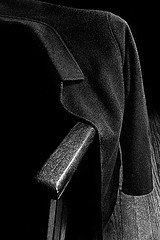Law of Attraction Wisdom from Will Smith

Before you decide which route to take, research the careers of directors you admire and see if you can see which route they followed.
Remember that there is no such thing as a route - only a route that is good for you: one that allows you to maximise you abilities and talent.
1. Studio/Guild Route
After securing the necessary minimum days of on-the-job training, join the Directors Guild with a signatory production company and work your way up the ladder. Some companies allow you to shadow a director, which gives you valuable training.
2. The Independent Route
Learn how to identify or create a low budget, 90-page script which you feel has something controversial to say. Scrape together some money and execute a 4:1 or 6:1 shooting ratio with high production values. Hire a sales agent and sell the film at AFM, Cannes, MIFED or Raindance, and make a profit for your investors. Repeat this process until you are discovered, or are considered a worthy risk for investors. Examples: Woody Allen, Steven Soderburgh (Sex Lies and Videotape), Quentin Tarantino (Reservoir Dogs), Hal Hartlyey (Swoon).
3. Screenplay Option Route
Write or purchase a script/story and sell it, releasing the screen rights only when you are hired as director. This technique is called holding your script hostage. Example: Return from Alcatraz
4. Student/Festival Route
Make a short film or ultra low budget feature and enter festivals, demonstrating your talent, gaining exposure to future clients and agents on the lookout for emerging talent. Hire a publicist to promote yourself,even if it is at the expense of your film. You are aiming to achieve notoriety or celebrity status. Examples: Buffalo 66, Trees Lounge, Blair Witch Project
5. Agency Packaging Route
After associating with celebrity actors or writers from a common agency, convince the agency to represent you as part of a package that they sell directly to production companies with you attached as director. The agency will usually attach name stars to your project as well. Example: Copland
6. Establish Yourself in Commercials
By offering to direct test commercials or pop promos for unknown bands,demonstrate your talent and original ideas,and convince a producer to hire you to direct. Examples: Ridley Scott, Tony Kaye (American History X).
7. Become a Master of the Short Form
Write and/or direct short films which demonstrate your talent. Enter festivals and competitions. When you have gained confidence,select several of your short films and approach either a production company (number1 above) or talent (number 5 above) and convince them to let you direct a long form film (feature). Example: Shane Meadows
8. Start as an Assistant Editor
This has been the classic route to directing used by many directors in the1940s
- 70s.Offer your services for free as an assistant editor:log shots, sync sound, until you are promoted to editor. When you have cut several films and impress with your knowledge of shots, get hired to direct a feature. Examples: David Lean, Francis Ford Coppola, Martin Scorsese.
9. Become a Successful Stage Director
Most stage directors do not realise how well equipped they are to direct film. Blocking, timing, storytelling and working with actors are all essential directing skills that many film directors lack. Why not start a theatre group with a few close friends (like Steppenwolf in Chicago, or Second City in Toronto) and build a reputation for exciting stage shows. Invite reviewers and agents, and wait to be discovered by a producer,or turn a stage show into a movie yourself. Examples: Sam Mendes, Stephen Daldry, Andrew Shea. on services film and video production services film and video production services film and video production services film and video production services film and video production services
Write Screenplays That Sell - The Ackerman Way
How Not to Write a Screenplay: 101 Common Mistakes Most Screenwriters Make
How to Write a Selling Screenplay
If you want to become the next great Hollywood filmmaker such as Steven Spielberg or George Lucas, you might want to look into taking some filmmaking lessons. Taking lessons will help you a great deal as you learn the ins and outs of the movie industry. You will find there are many businesses and schools that can help you out.
There are many filmmaking classes and courses available throughout the country at various colleges and universities. There are also some film-specific schools around. You should be able to find quite a few by conducting an internet search for 'filmmaking schools.' Online schools are becoming popular as you can learn at your own pace.
You can take filmmaking lessons in person individually as well as in a class setting. You can also take online filmmaking classes and courses that teach you with a series of videos. If you're serious about becoming a filmmaker you'll need to take several courses. These will deal with screenwriting, directing, producing, casting, cinematography, and editing etc.
Many movies are made with the help of computer-generated effects and animation these days, so you may need to spend some money on special types of computer software. These may help you out a great deal when it comes to creating special effects.
The courses generally require you to combine several different careers all into one. Independent filmmakers need to know each and every aspect and skill of making a movie. This will prepare them in case they need to make one from scratch all by themselves.
The cost of taking filmmaking lessons will vary. It really depends on what type of lessons you're taking, personal or over the internet. Personal lessons will generally cost you more. You should do some research on any company or school who is offering to teach you to make sure they're reputable and qualified.
The Master Course In Film making
Power Filmmaking Kit
Naked Filmmaking: How To Make A Feature-Length Film - Without A Crew - For $10,000 Or Less